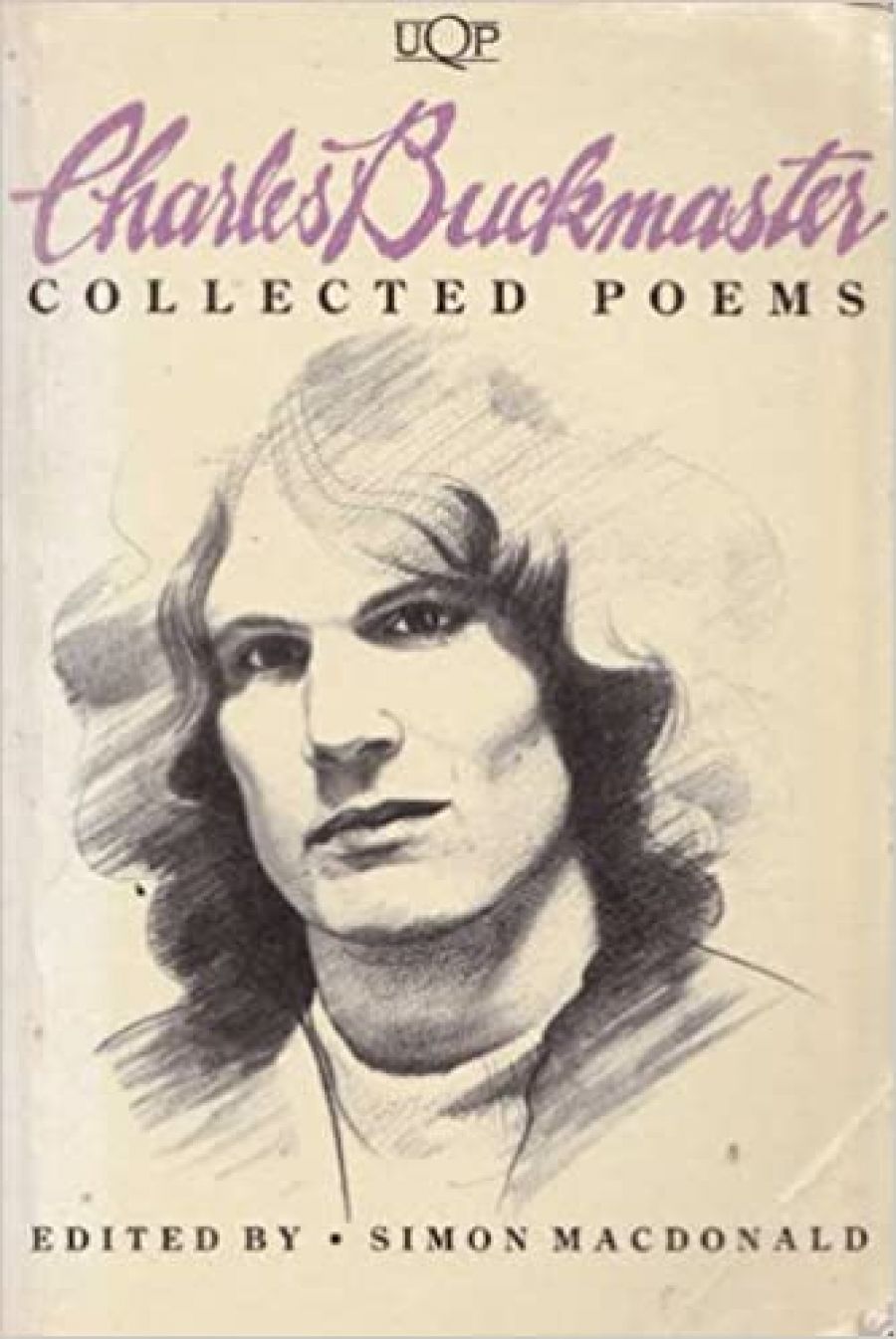
- Free Article: No
- Contents Category: Poetry
- Review Article: Yes
- Online Only: No
- Custom Highlight Text:
All poets have two chances of being remembered. A few, the strongest of their age, compose a handful of poems that resist time and indifference. Many more never attain anything like poetic strength, yet their works are preserved because they embody a particular style or period. It is still too early to judge where Charles Buckmaster will be placed in the ranks of Australian literature. Already, though, the process of canonisation has started, and at the very least Buckmaster is likely to be read as an exemplary figure of Australian poetry in the 1960s.
- Book 1 Title: Collected Poems
- Book 1 Biblio: University of Queensland Press, $16.95 pb, 168 pp
An exemplary figure in two senses: first, because Buckmaster’s work illustrates, almost better than that of his contemporaries, the energy and excitement that younger Australian poets felt in the 1960s and 1970s; and second, because, at its best, his poetry serves as a model of lyric form. Even so, Buckmaster has never had the attention he deserves. If Robert Adamson and Michael Dransfield have attracted the greater publicity (they had unerring abilities to fulfil social myths and so appear ‘poetic’), Buckmaster has written more pungently than Adamson and, at times, more movingly than Dransfield. Unfortunately, it has been virtually impossible to obtain Buckmaster’s work. In his lifetime he published only two books – Deep Blue and Green (1970) and The Lost Forest (1971) – neither of which has been available in recent years. Until now, many of Buckmaster’s admirers have had to seek out his poems in scattered anthologies.
In this timely Collected Poems, Simon MacDonald has included a range of previously unpublished poems as well as some miscellaneous writings. Not all of Buckmaster’s work is represented, for in his last years (he committed suicide in 1972 at the age of twenty-one) he destroyed much that he wrote. Perhaps other poems will be discovered and a new edition published; for the time being, however, this is an indispensable book for anyone interested in Buckmaster’s verse.
So it is a shame that this collection is not more informative: although each poem is dated, it would have been good to know which poems appeared in the earlier collections, and in which papers or journals they were first published. It is a pity, too, that the University of Qµeensland Press has chosen to print the text in such a small and unattractive typeface and – to add insult to injury – to feature a saccharine line drawing of Buckmaster on the front cover.
Buckmaster is perhaps best known for ‘A History of the Father’, a series of related lyrics that traces the history of Lilydale and Gruyere. The exploitation of the land and its original inhabitants is economically evoked, while Buckmaster’s strength, here as elsewhere, is in his ability to use myth to shape his materials:
These, the descendants
of the men of the old forest:
Europeans –
hill tribesmen: – i could imaginea sepia print – men: tall and bearded
standing at the foot of the Ygdarsill
clutching at axes,
spearsand twohanded swords.
Nothing out of place here, not a word or a line break or a dash. And yet, placed beside some of Buckmaster’s finest lyrics, these lines can almost seem contrived. Here is the opening of an early poem, ‘winter sun in the morning’:
winter sun in the morning –
and i feel less alone.fresh floating air and cigarette
smoke –
drifts about.wind on the water on the rainbarrel.
a breeze begins:
wet washing on the line
flaps heavy.
tossed about.clouds fly.
the wind is making them move.
If some of this poem’s charm derives from William Carlos Williams, it still has lustres of its own, not the least being the careful phrasing and placing of ‘wet washing on the line / flaps heavy’. A less confident writer would have written ‘flaps heavily’ and lost everything.
At his best, Buckmaster had a deep confidence in his art, and he was often at his best – in ‘summer coming in’, ‘Vanzetti’, ‘not by words’, ‘Glen Ewart’, ‘main street dust song’, and ‘Willochra’. Buckmaster had the supreme gift of writing naturally and simply (that is, of effectively disguising his artistry), and nowhere more so than in that haunting lyric ‘in the hour’. Here, in the poem’s closing lines, is Buckmaster’s authentic voice:
in the hour
in the hour of geese …
sunlight..
at 9 p.m. earlyin the nighttho..early sunlight?
possibly –
but i dont knoworcare –
and thats important…in the hour
in the hour of the geese


Comments powered by CComment